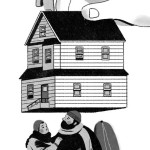As originally published in the Huffington Post.
Straight out of Lubbock, Texas comes the latest escalation of a nationwide battle over how millions of American homes receive natural gas fuel. As Buddy Holly’s hometown considers becoming the first U.S. community to adopt a new standard for a certain type of gas piping, an advocacy foundation is asking big-box retailers Lowe’s, Home Depot and Menards to stop selling the “yellow CSST” pipe/tubing under question.
At issue, explains the non-profit Brennen Teel Foundation For Gas Line Safety, is a type of flexible gas tubing called “yellow CSST,” which stands for “corrugated stainless steel tubing.” Developed in Japan and prized for flexibility that allows it to survive earthquakes and empower easier installation than black iron pipe, CSST has been used for decades.
However, in recent years, yellow CSST has alarmed many because of house fires caused by lightning that hits homes, or near homes, and may damage the tubing. Lubbock officials determined the death of 31-year-old Brennen Teel was caused by yellow CSST failing after a 2012 lightning strike.
I’ve noted before how Brennen’s tragic death sparked an advocacy campaign and illustrates that America’s litigation system can push reform. Expansive testing of the gas tubing has been done by victim’s attorneys, and a strongly worded letter “warning” builders over the summer came not from regulators but from lawyers. (To anticipate comments: We all realize that the attorneys have a self-interest in the research, but I truly believe this effort goes beyond “client relations.”)
Lavera Vincent, executive director of the Teel Foundation, confirmed that the organization sent letters on Sept. 17th, to Home Depot, Lowe’s, and Menards asking that they stop selling yellow CSST.
One worry: CSST should be installed by gas contractors who have been certified by the manufacturers. Given the history of yellow CSST, and the challenges with lightning and the reliance of contractors properly installing the product to specific manufacturer guidelines, it’s actually hard for me to understand why these big box stores would make it available where unsuspecting non-contractor homeowners could buy it and install it themselves.
In fact, sources tell us that the largest CSST manufacturers refuse to sell via the “big box” stores because of concerns that the general public does not have enough information or the expertise about how to properly install CSST.
“As you may know,” the Teel letter to retailers states, “yellow CSST has been linked to deaths and property damage due to lightning-related fire that can lead to perforation of this particular yellow gas piping.”
The letter also notes that “… certain new products on the market are adhering to a higher standard for lightning resistance (referred to as LC1027) which has proven effective. We request that you carry a safer product so consumers are unable to purchase yellow CSST off-the-shelf.”
Even when there are proper controls in place, the installation requires bonding and separating the yellow product in a specific way to make it safer when lightning hits a house. Despite extensive education efforts, there is little confidence that these steps are always achieved. That is probably why two of the leading manufacturers do not even sell “yellow” CSST anymore.
Apparently, only one leading manufacturer, Ward Manufacturing, Inc., owned by Hitachi is still selling yellow CSST in the U.S., joining two smaller players Proflex and Homeflex. This begs the question, why are Ward and others refusing to raise their standard for this gas piping when advancements in technology have created an alternative for American homeowners?
Moving to the higher standard is also a stated goal of Lubbock’s senior building officials.
Steve O’Neil, Lubbock’s chief building official for more than a quarter-century, has explained to National Courts Monitor producers that a special “fuel gas committee” was formed after Brennen’s death to look into their situation and is recommending that Lubbock become the first U.S. community to adopt the highest standard for CSST pipe going forward.
O’Neil explains that CSST comes in three broad categories known first by color: “yellow,” which was the go-to product for decades, and two kinds of more recent “black” CSST. He says a few brands control about 80-plus percent of the CSST market, so for shorthand he notes that the FlashShield brand is one type meeting a LC1027 standard while another common brand, CounterStrike, represents what’s known as the LC1024 standard. By comparison, the LC1027 tests the product to 8 times higher electrical arcing energy than the LC1024.
Generally, CSST made to the LC1027 standard incorporates a protective metal shield. And we should be clear that many building professionals contend that yellow CSST is safe, if properly installed, which includes proper bonding and physical separation from other metallic systems – thus the Teel request for “strong warning” if retailers continue to sell the pipe. The Teel Foundation disputes that, contending that the do-not-sell request “… is specific to yellow CSST product as it has been the subject of failure even with the proper bonding and ground of the product, including Brennen’s case.”
O’Neil, the Lubbock official, agrees that increased safety comes with evolving to the higher standards. He says “… there’s just a huge difference” in safety performance and the cost difference is really pennies per foot.
The fire-code community is taking notice of the Lubbock situation, in part because there are hundreds of CSST-related lawsuits around the country. In the U.S., where fire codes are a patchwork of local rules influenced by national standards, these cases are how change happens.
So far, Vincent and the Teel Foundation seem pleased with the quick acknowledgement of their request to the retailers. We’ll keep an eye out for their formal response.
As the debate ensues, anyone still selling yellow CSST should know that the “LC1027 standard” has some highly motivated activist-lawyers mobilizing to support new standards. So, in that world, all eyes on Lubbock.
